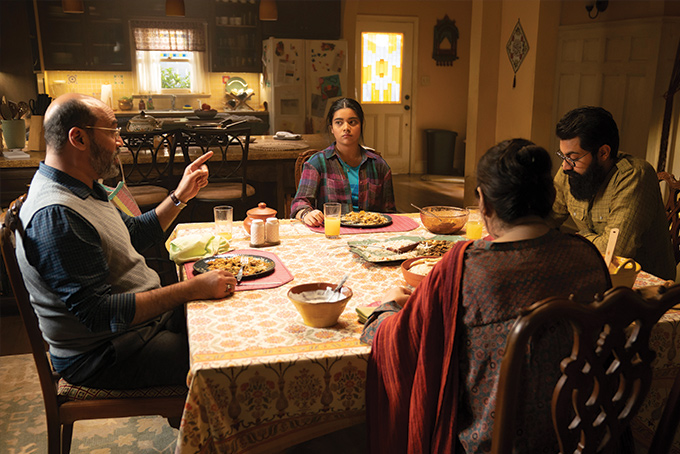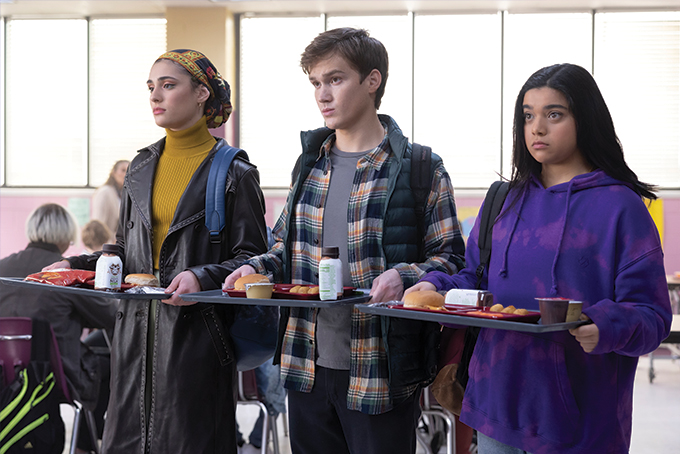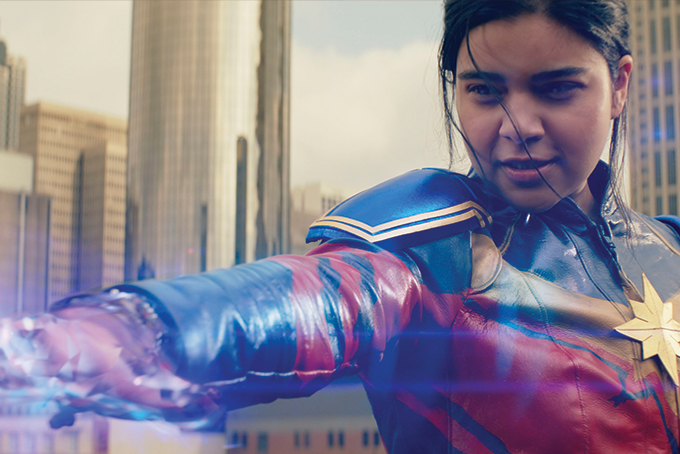Spoiler alert: This story contains spoilers for the first two episodes of Ms. Marvel.
The newest character in the Marvel Cinematic Universe (MCU) has a lot going for her. Played by relative newcomer Iman Vellani, 16-year-old Kamala Khan is dorky, lovable, empathetic—and just happens to be a powerful superhero bestowed with grand capabilities.
When we first meet Kamala, the high-schooler immediately appears to be achingly relatable to many of us. She is the embodiment of a Marvel fangirl—from her poster-clad bedroom walls splashed with MCU references to her T-shirt with pictures of Captain Marvel, Wasp and Valkyrie on it. She is also highly imaginative, and her world bursts with vibrant doodles, a subtle nod to the style of the comics Ms. Marvel first appeared in.

Kamala is the first Pakistani superhero in the Marvel cannon, and the first Muslim character to headline her own comic books. She offers a unique view into the modern South Asian American family, something the MCU has yet to explore. As the first two episodes clearly show—even superheroes aren’t immune to a desi mother’s nagging. Kamala’s mother Muneeba is a traditional woman who wants the best for her daughter, while her father Yusuf is supportive of her creative mind and idiosyncratic fascinations. Aamir, Kamala’s self-proclaimed wise older brother, is her anchor, helping to bridge her parents’ values and expectations with Kamala’s own aspirations.
As many kids from the South Asian diaspora know, it is a fine balancing act growing up with immigrant parents, learning to accept their love without sacrificing your own dreams. Kamala’s character is in a ripe position to be the voice of a generation and tell a story seldom seen in mainstream media. And if this early glimpse Ms. Marvel is anything to go by, the show plans to do a fine job of bringing the Muslim-American experience to the forefront.

Diversity is at the very core of the show. Ms. Marvel is rich in culture, allowing viewers to gain a nuanced glimpse into the lives of young Muslim Americans. While they may not be superheroes, Kamala’s friends Nakia and Bruno are equally interesting. Right off the bat, Nakia shows herself to be a strong character who breaks plenty of stereotypes about women who don the hijab. Opinionated and willing to stand up for for anything she believes in, Nakia fights to become the next mosque leader—a pivotal plot line that sets the tone for the kind of subversive role model she is.
Kamala, on the other hand, displays pride in her heritage through the media she consumes and her relationship with her family and friends. Marvel comics are not her only interest—Kamala has a voracious appetite for classic Bollywood films, in turn influencing her childhood friend Bruno, who even picks up some conversational urdu from her.

Her family, too, play a key role in setting up Kamala’s backstory, especially since the very object that appears to give her powers is a gold bangle belonging to her grandmother. When the teenager stitches together her iteration of a Captain Marvel suit for a costume competition out of family heirlooms—a red silk scarf and the aforementioned jewellery—she accidentally discovers new abilities.
What is refreshing about Ms. Marvel is that while Kamala’s heritage is not glossed over, it never consumes her identity. At the end of the day, she is still a superhero with villains to tackle—brown-skinned or not. Kamala finds that she can shoot cosmic projectiles and extend her limbs to incredible proportions, but her skills leave much to be desired when put to the test. She grapples to gain control over her powers, often leading to dire consequences for herself and those she tries to protect—like the little boy who sustains injuries when Kamala’s focus wavers while trying to rescue him from falling off the edge of a building.

Despite her struggles, Kamala’s earnest nature leads viewers to root for her in every challenge she faces. And it is Vellani’s excellent performance that renders the character so relatable. The 19-year-old, who will reprise the role of Ms. Marvel in the upcoming film The Marvels, injects her character with a sense of bright-eyed wonder that makes her impossible not to like.
The value of Ms. Marvel being well-loved cannot be overstated. Muslim characters have often been portrayed in a negative light on television, so positive representation serves to subvert those stereotypes amongst non-Muslim viewers, as well as elevate the self-esteem of individuals from the marginalised group, giving them role models to aspire to. Ms. Marvel seems to be well on its way to ground-breaking South Asian representation, and while the first two episodes gave solid context for Kamala’s background, what remains to be seen is how she comes into her identity as a superhero. One thing is for sure—she is going to need more training on the rooftop of Bruno’s apartment, and we are here for all of it.
Ms. Marvel is streaming on Disney+.





